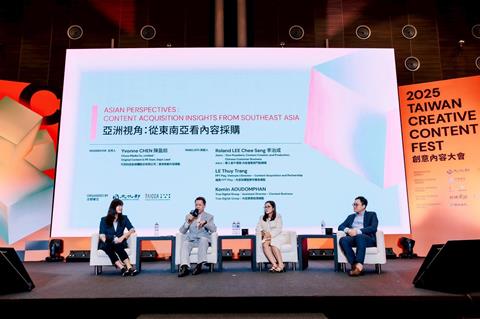
Executives from some of Asia’s leading content providers shared their perspectives on the challenges and opportunities facing their streaming platforms in a discussion at the Taiwan Creative Content Fest (TCCF) on November 6.
The discussion took place between Roland Lee, vice president, content creation and production, Chinese customer business at Malaysia’s Astro; Le Thuy Thang, director – content acquisition and partnership for Vietnam’s FPT Play; and Komin Aoudomphan, assistant director of content business at Thailand’s True Digital Group, and was moderated by Yvonne Chen, original content & PR team, dept. lead from Taiwan’s Choco Media Co., Limited.
Audience Insights
When it comes to what kind of (and how much) content to acquire, each of the executives agreed that knowing one’s audience is key.
“Malaysian audiences are now exposed to many different types of content from around the world,” said Lee. “Our customer insights tell us what type of content is enjoyed by our audience, and helps us choose what kind of content to acquire in terms of genre, cast, type of content, and from which market, especially when it comes to Asian territories.”
Le noted that FPT Play’s origins as an IT powerhouse help when it comes to analysing its customers, and identified three key factors in what kind of content resonates: content with global production value but local resonance; variety, including dramas, reality series and sports content; and exclusivity and freshness.
“Today a customer sees that this service has good sports, so they subscribe, but tomorrow they go somewhere else for more interesting drama series or sport tournaments, so freshness and exclusivity really matters. We need to keep a close focus on what our audience wants to keep them with us.”
Aoudomphan noted that there is an important balance between listening to the audience and listening to the market: “About five years ago, we were licensing a lot of Korean content, because it was a big hit in Thailand, but then we recognised that the content costs keep increasing. We continue to listen to audiences but consider business costs as well, balancing what we can offer,” noting that his service had begun to shift focus to Chinese-language drama series.
To License or to Produce?
Finding balance between locally produced versus globally acquired content was another big theme of the discussion.
Producing local content is more expensive than licensing international content from abroad, but it draws more eyes, said Aoudomphan, adding that finding a way to make that locally produced content travel outside the country by finding international partners is an important topic.
Le shared that in Vietnam, because exclusivity is so important, most broadcast TV stations are reluctant to sell their original content to streaming services.
“Instead, we have to produce our own originals, but because they require large budgets, we can’t produce that many a year,” said Le. “Customers now demand content that meets global standards, so acquiring international content makes sense from that perspective.”
Lee said that the Malaysian market offers specific challenges because it includes multiple languages. Malaysian content filmed in Chinese, for example, has to compete with content from Singapore, Taiwan and mainland China. However, this language factor also offers advantages: Malaysian dramas and films can bring in international stars from abroad, giving local content an international feel. Such content can also be licensed to other platforms outside Malaysia, added Lee, citing their sale of the series The Queen’s Ploy to Netflix.
Asian countries can also team up to co-produce original content, said Aoudomphan, mentioning True CJ Creations, which was created in partnership between Thailand and Korea and which has produced Thai-language remakes of Korean content.
Le noted that even licensing content from abroad requires its own form of production: namely, localisation and marketing.
“If we don’t properly localise and market a piece of content to meet the demands of our customers, it will fail even if the title is good,” said Le. Part. This process goes back into audience insight, using data to analyse whether the audience base for a certain title will prefer subtitles or dubbing, for example.
The Taiwan Factor
One big topic on the minds of the TCCF audience: what it takes for Taiwanese content to succeed in other countries.
“When we choose to license something from Taiwan, one important factor is whether the talent is known in Malaysia,” said Lee. “Our audience needs be familiar with at least or one two of the lead actors. You don’t necessarily need a big budget, but you do need some cast members people are familiar with.”
Le agreed, saying that while Taiwanese content features high-quality storytelling, it needs recognisable cast members in order to travel in Vietnam. Meanwhile, Aoudomphan emphasised the importance of “image and identity.”
“People identify Korean content with romance, for example. We need to find out what that is for Taiwanese content. Once people become familiar with Taiwanese content, you don’t need to rely on that hook, but it’s key at first.”















![[L-R]: Amanda Villavieja, Laia Casanovas, Yasmina Praderas](https://d1nslcd7m2225b.cloudfront.net/Pictures/274x183/6/4/1/1471641_pxl_20251224_103354743_618426_crop.jpg)









No comments yet